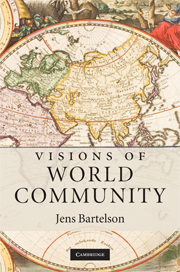2 - Paradoxes of world community
Published online by Cambridge University Press: 18 January 2010
Summary
In the previous chapter, I said that bounded conceptions of community have become a major source of trouble, since many of the political problems we have to confront today are boundless in character. In this chapter, I shall try to substantiate this claim through a critical overview of contemporary cosmopolitan theory. My argument is very simple. While many political theorists would like to expand the scope of political community beyond the world of states, the conceptual means at their disposal carry significant semantic baggage from that very world. Consequently, their proposals are prone to project vaguely nationalistic assumptions onto the new forms of political life they struggle to flesh out and justify, yet most of this ‘nationalism’ is but a corollary of the underlying assumption that communities have to be bounded in order to qualify as communities in the first place.
But as long as we believe that communities need to be bounded, we will find it difficult to make coherent sense of the concept of world community, since a community cannot be fully inclusive and still have boundaries. Although this chapter cannot claim to provide any exhaustive analysis of contemporary theories of world community, the intention is to show that their underlying social ontology gives rise to a set of paradoxes that are impossible to solve within the same conceptual framework within which they have been formulated. As I will try to show in this chapter, contemporary theories of world community either fail to fully articulate the universalistic assumptions upon which they are based, or they unwittingly reproduce a logic of identity according to which communities are identical to themselves only by virtue of being different from each other.
- Type
- Chapter
- Information
- Visions of World Community , pp. 19 - 45Publisher: Cambridge University PressPrint publication year: 2009

